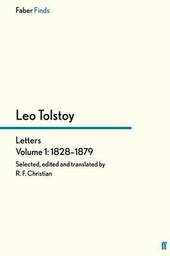
|
Tolstoy's Letters Volume 1: 1828-1879
Paperback
Main Details
| Title |
Tolstoy's Letters Volume 1: 1828-1879
|
| Authors and Contributors |
By (author) R. F. Christian
|
|
By (author) Leo Tolstoy
|
|
Introduction by Rosamund Bartlett
|
| Series | Leo Tolstoy, Diaries and Letters |
|---|
| Physical Properties |
| Format:Paperback | | Pages:368 | | Dimensions(mm): Height 234,Width 153 |
|
| Category/Genre | Prose - non-fiction |
|---|
| ISBN/Barcode |
9780571324071
|
| Classifications | Dewey:891.763 |
|---|
| Audience | |
|---|
| Edition |
Main
|
|
Publishing Details |
| Publisher |
Faber & Faber
|
| Imprint |
Faber & Faber
|
| Publication Date |
19 March 2015 |
| Publication Country |
United Kingdom
|
Description
'This country's leading Tolstoy scholar has selected, edited and translated a two-volume set of Tolstoy's Letters, which represents academic publishing of the highest kind.' Yorkshire Post Leo Tolstoy was unquestionably the most prolific letter-writer of all the great Russian novelists of the nineteenth century. In this selection of his correspondence, meticulously edited by R. F. Christian, readers can discover Tolstoy's views about his own work and that of other writers, his evolving attitudes towards the times through which he lived, and his deep meditations on family, friends, and himself. This first of two volumes of the Letters is divided into five sections and spans the years from 1828 to 1879. 'Professor Christian's selection is a major act of scholarship and publication.' George Steiner, Sunday Times 'Both scholarly and easy to read . . . exceptionally rewarding.' Raymond Williams, Guardian 'Enthralling and deeply moving . . . English Tolstoyans will not be extravagant if they attach to this work Thucydides' epigraph "A possession for ever."' Sir William Hayley, Times
Author Biography
Professor R. F. Christian is one of the major scholars of Russian literature of the last one hundred years. Most especially he is associated with Tolstoy being accorded the highest praise from authors and critics like A. N. Wilson, Jay Parini and George Steiner. Among his publications are Tolstoy: A Critical Introduction, Tolstoy's 'War and Peace': A Study and his definitive editions of Tolstoy's Letters and Diaries (both in two volumes). The Letters and Diaries as well as his 'War and Peace' book have been reissued in Faber Finds. Professor Christian was born in Liverpool, graduated from Oxford University with a first-class honours degree in Russian, joined the Foreign Office and was Attache at the British Embassy in Moscow. His academic career began at the University of Liverpool. At the University of Birmingham he became Chair of Russian Language and Literature. He moved to the University of St. Andrews from where he retired as Head of the Russian Department. A man of many interests beyond the academic, it has been said of him that 'he has always welcomed change if it led to improvements in standards of teaching and research, but one who has always resisted the idea of change for change's sake.' Count Lev Nikolayevich Tolstoy (1828 -1910) is widely considered one of the greatest novelists of all time, principally for his War and Peace (1869) and Anna Karenina (1878). George Steiner has praised him as 'a colossus bestriding the palpable earth, evoking the realness, the tangibility, the sensible entirety of concrete experience.' Born in Yasnaya Polyana to a family of old Russian nobility, Tolstoy would abandon his university studies to spend time in Moscow and Saint Petersburg, running up significant gambling debts before travelling with his older brother to the Caucasus and joined the army. He began his writing career in the 1850s, publishing an autobiographical trilogy: Childhood (1852), Boyhood (1854) and Youth (1857). He served in the Crimean War and wrote the much-admired Sevastopol Sketches (1855-56). After travelling in Europe Tolstoy settled to family life and the composition of his major works. He would also describe his conversion to Christianity in Confessions (1879) and produce the novella The Death of Ivan Ilyich (1884) and the novel Resurrection (1900) prior to his death in 1910.
|